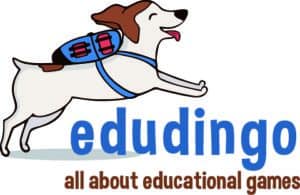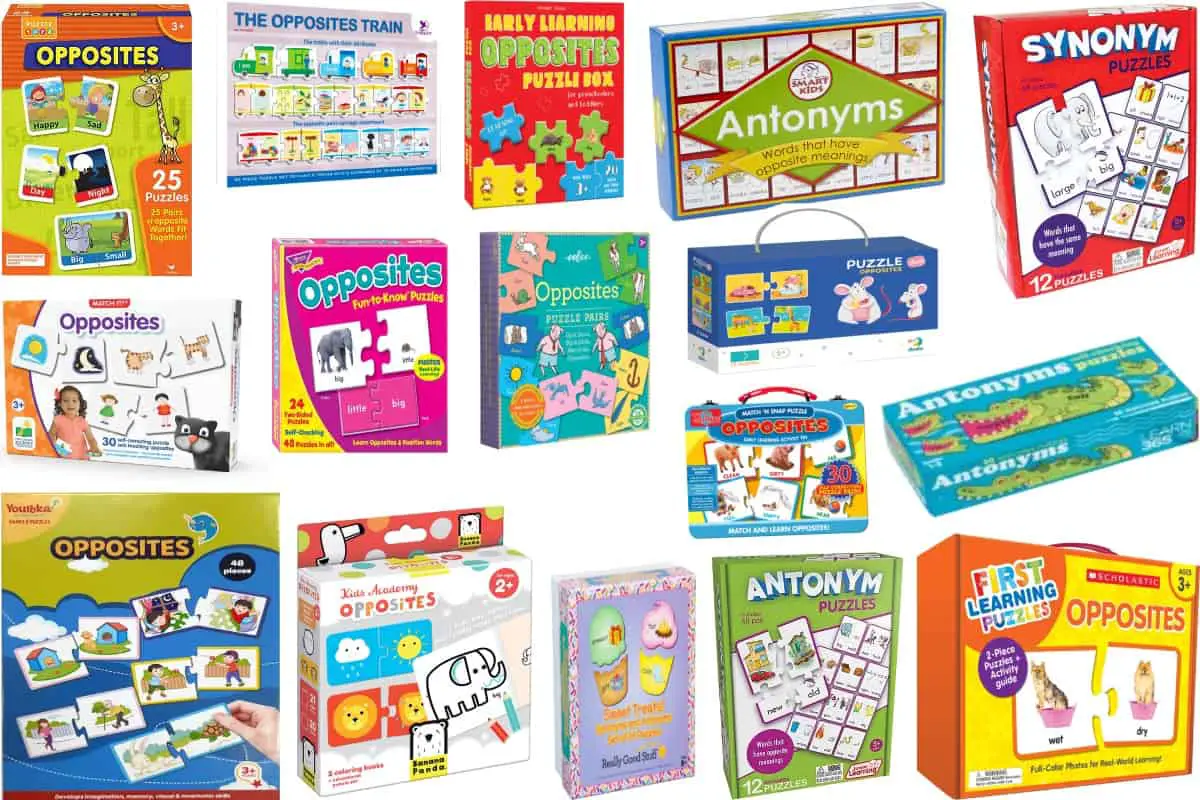This post contains affiliate links.
Learning about synonyms and antonyms (opposites) improves children’s vocabulary. They also provide opportunities to develop speaking and critical thinking skills.
And puzzles are a great way to do this, as they enable children to check by themselves if they have found a correct match. The 20 synonyms and antonyms puzzle games I share here allow for independent, cooperative, and competitive playing.
Synonyms and Antonyms Puzzle Games Comparison Table
| Game | Age | For | Words | Rating |
|---|---|---|---|---|
| First 100 Shapes & Opposites Puzzle Cards | 3+ | Families | 24 | ★★☆☆☆ |
| Opposites (Kids Academy) | 3+ | Families | 20 | ★★★☆☆ |
| Opposites (Youreka) | 3+ | Families | 40 | ★★★☆☆ |
| Match It: Opposites | 3+ | Families | 30 | ★★★★☆ |
| Opposites (Bendon) | 4+ | Families | 60 | ★★★★☆ |
| Puzzle Opposites | 4+ | Families | 24 | ★★★★☆ |
| Opposites (Trend Enterprises) | 4+ | Families | 48 | ★★★★★ |
| Opposites (eeBoo) | 4+ | Families | 50 | ★★★★☆ |
| First Learning Puzzles: Opposites | 4+ | Families | 50 | ★★★★☆ |
| Early Learning Opposites Puzzle Box | 4+ | Families | 40 | ★★☆☆☆ |
| Antonyms (Smart Kids) | 5+ | Families | 40 | ★★★★☆ |
| Antonym Puzzles | 5+ | Families | 24 | ★★★★☆ |
| Opposites (Berwick Offray, LLC) | 5+ | Families | 24 | ★★★☆☆ |
| Synonym Puzzles | 5+ | Families | 24 | ★★★☆☆ |
| Synonyms (Smart Kids) | 5+ | Families | 40 | ★★★☆☆ |
| Antonym Match-Ups | 6+ | Families | 24 | ★★★☆☆ |
| Antonyms Self-Checking Puzzles | 6+ | Families | 60 | ★★☆☆☆ |
| The Opposites Train | 6+ | Families, Schools | 80 | ★★★★★ |
| Synonym Match-Ups | 6+ | Families | 24 | ★★★☆☆ |
| Sweet Treats | 8+ | Families, Schools | 96 | ★★★★★ |
Synonyms and Antonyms Puzzle Game
Sweet Treats (Really Good Stuff)
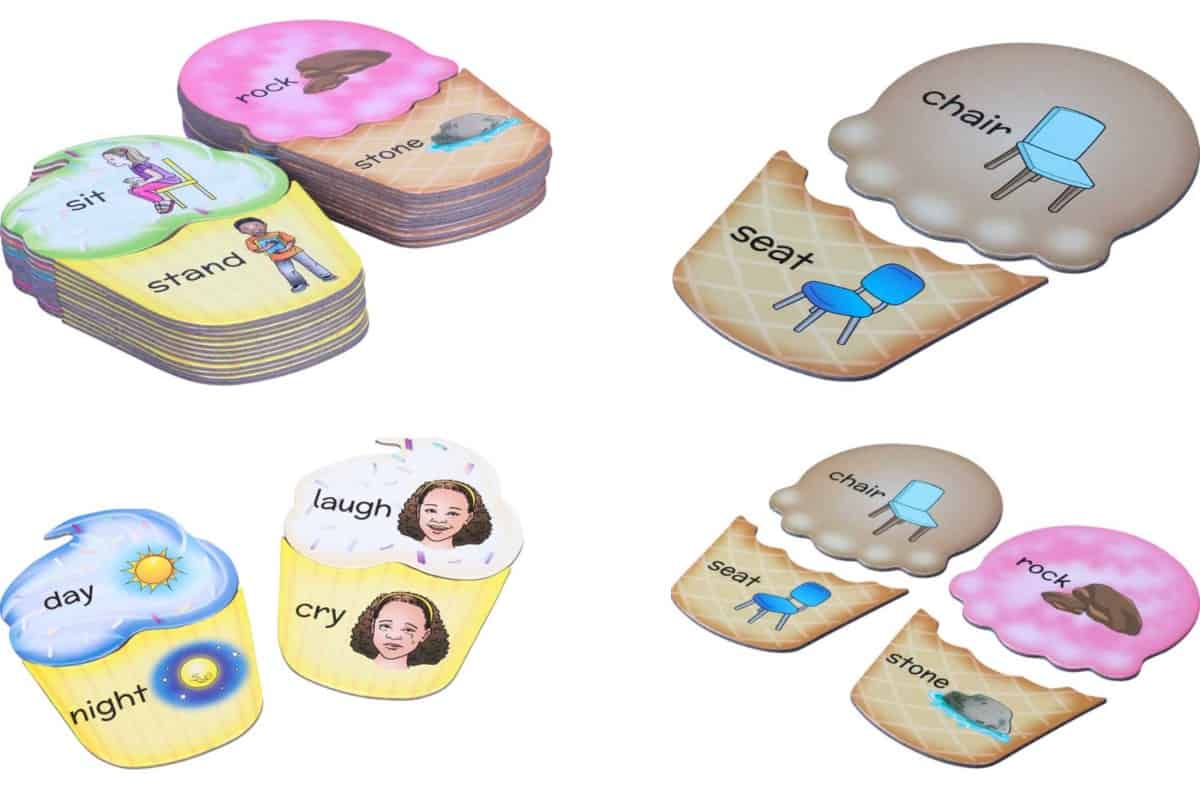
★★★★★
For Families and Schools | Age 8+ | 1+ players | Duration 10-20 min
Sweet Treats is a dessert-themed synonym and antonym puzzle. The synonyms are printed in ice creams and antonyms in cupcakes with words and illustrations.
is a dessert-themed synonym and antonym puzzle. The synonyms are printed in ice creams and antonyms in cupcakes with words and illustrations.
This set comes with 48 puzzles – 24 for each category. Students only need to find matching puzzles to pair synonyms or antonyms together. I recommend it for homes and schools because:
- It features common nouns, adjectives, and verbs
- It is self-correcting, so children can play independently
- It is age-appropriate
- It is easy to play
My only issue with the game is the number of puzzles.
Antonyms Puzzle Games
Opposites (Bendon)
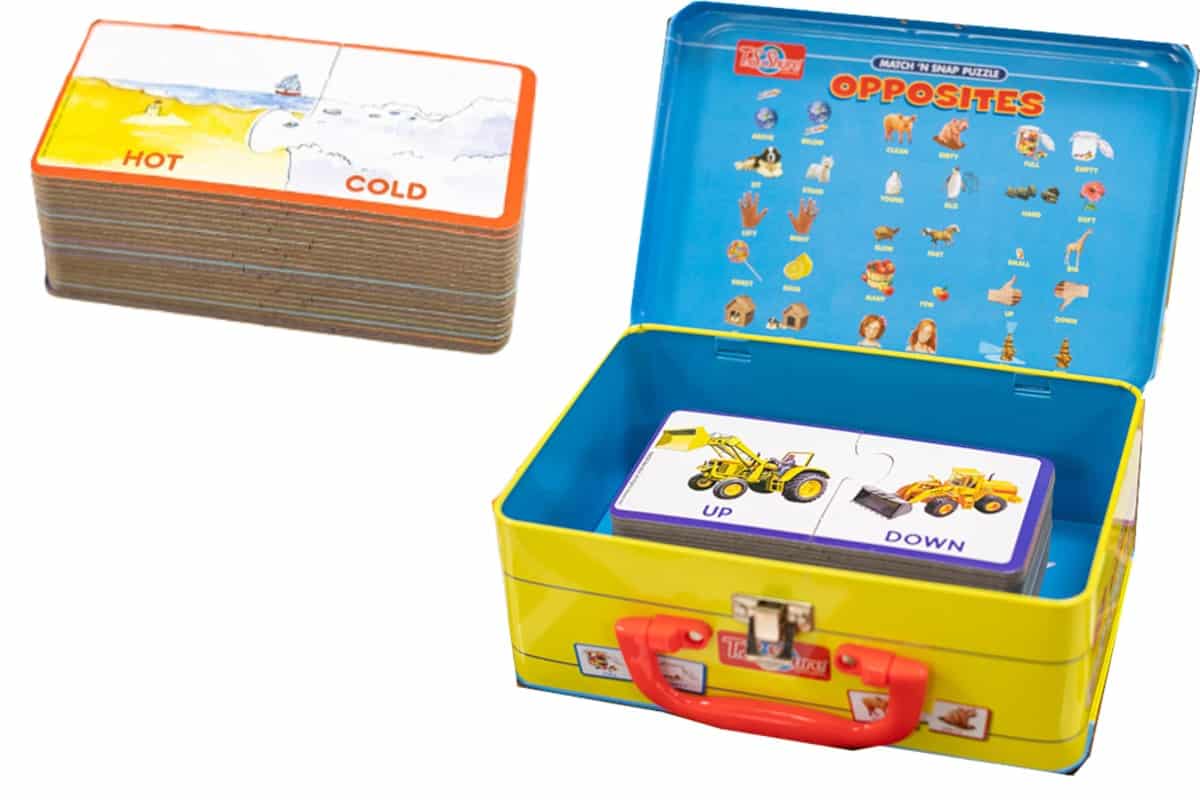
★★★★☆
For Families | Age 4+ | 1+ players | Duration 10-20 min
Bendon’s Opposites features common words and illustrations that you can use to teach antonyms to younger children. This set comes with 30 puzzle pairs (60 words).
features common words and illustrations that you can use to teach antonyms to younger children. This set comes with 30 puzzle pairs (60 words).
I like this game because it is child-friendly. The puzzles are big enough for kids’ small hands, so it is also suitable for developing fine motor skills. It also:
- Develops print awareness skills
- Improves hand-eye coordination of preschoolers
- Widens their vocabulary
- Allows for self-correction
This can be great to use in preschooler classrooms too. However, adult supervision may be necessary to figure out some concepts because they may not always be clear for young children.
Antonym Match-Ups (Lakeshore Learning)
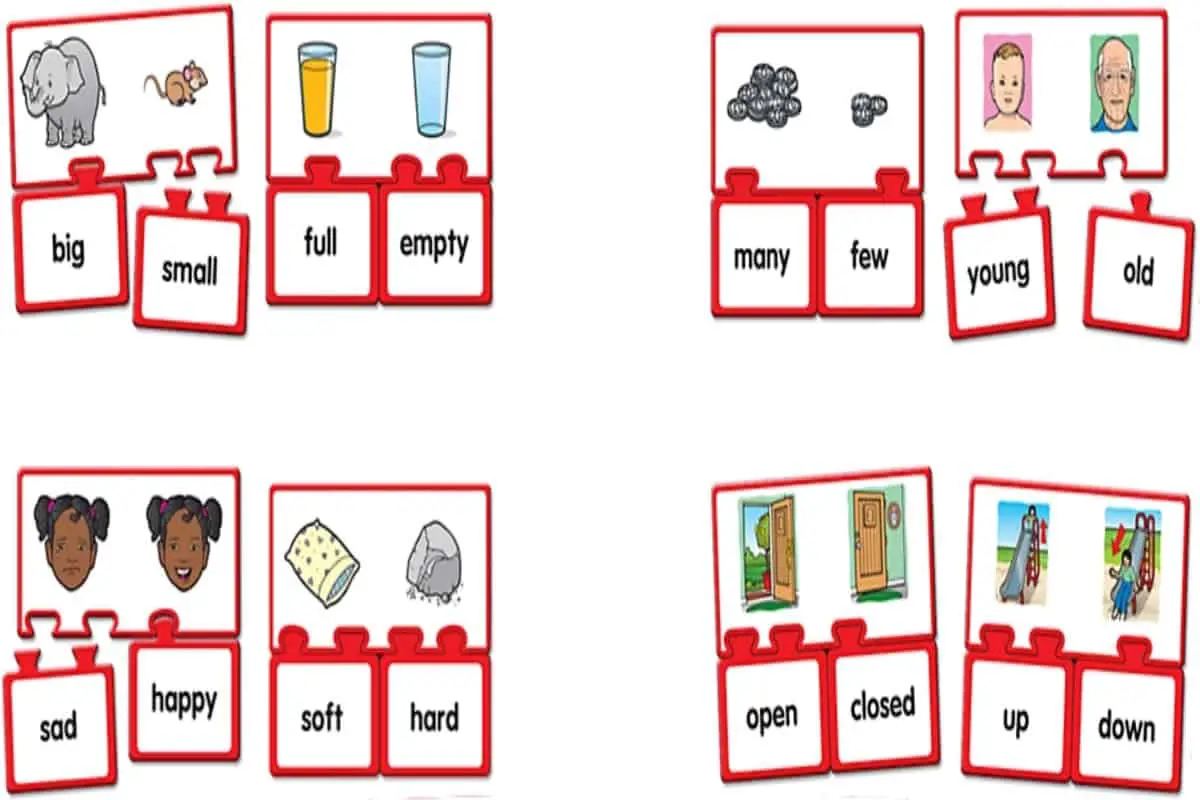
★★★☆☆
For Families | Age 6+ | 1+ players | Duration 10-20 min
Antonym Match-Ups is another three-piece puzzle set, but for opposite pairs. It features 12 antonym matches and pieces with words and pictures. The game includes the following terms:
is another three-piece puzzle set, but for opposite pairs. It features 12 antonym matches and pieces with words and pictures. The game includes the following terms:
- Big-small
- Full-empty
- Open-closed
- Up-down
- Dirty-clean
- Hot-cold
- Sad-happy
- Soft-hard
- Wet-dry
- Float-sink
- Many-few
- Young-old
This set is appropriate for first graders and children who already know how to read decodable words and sight words. I like this game because children can use it with ease. It is also self-correcting, so minimal guidance is needed during play, and children receive immediate feedback.
However, there are only 24 words in this set, so it has low replayability.
Antonyms Self-Checking Puzzles (Oriental Trading)
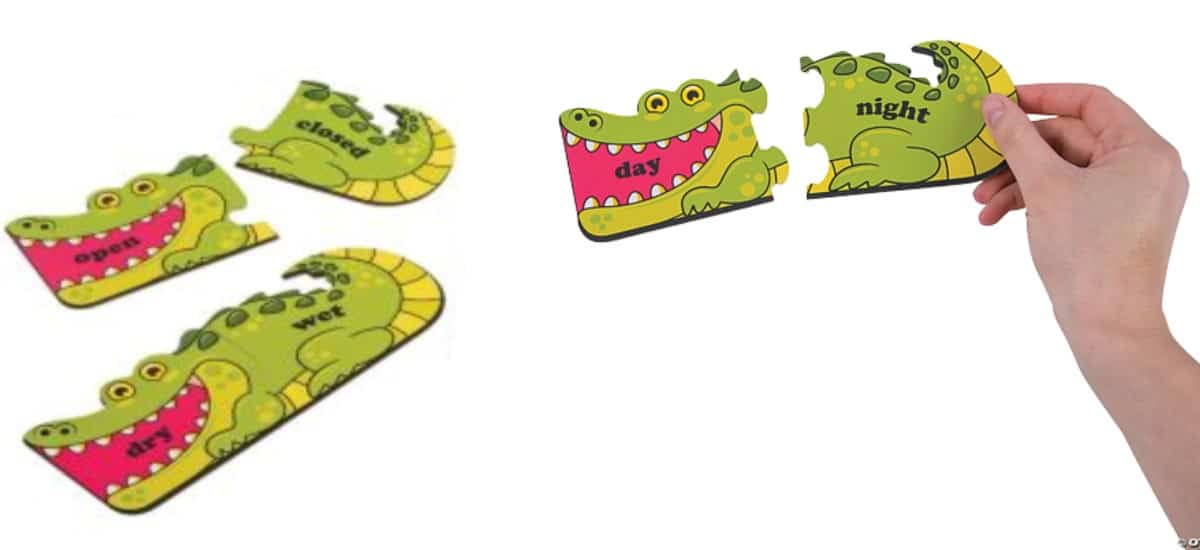
★★☆☆☆
For Families | Age 6+ | 1+ players | Duration 10-20 min
Antonym Self-checking Puzzles feature 30 opposite pairs in a fun crocodile-shaped piece. This set comes with 60 decodable words and sight words perfect for first graders. Some of the words included in this game are:
feature 30 opposite pairs in a fun crocodile-shaped piece. This set comes with 60 decodable words and sight words perfect for first graders. Some of the words included in this game are:
- open-closed
- wet-dry
- left-right
- start-finish
- day-night
- front-back
- sad-happy
It has easy-to-read words, but the notions are not illustrated at all (all pieces feature the same crocodile), while for other games there always is a visual hint of the meaning of the words used. Beginning readers can use them without adult supervision. The pieces are also self-correcting, so players get immediate feedback. They are also big – 8” by 3”.
Antonyms (Smart Kids)
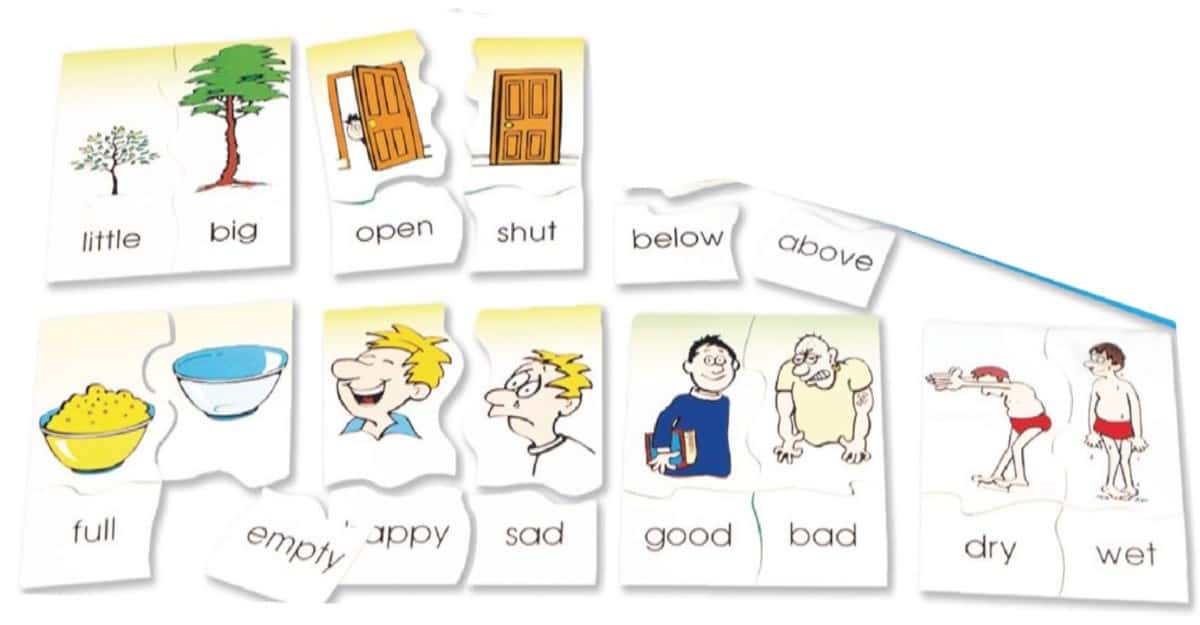
★★★★☆
For Families | Age 6+ | 1+ players | Duration 10-20 min
Antonyms by Smart Kids is a set of 20 puzzles. Each puzzle shows illustrations of opposite pairs, which include common nouns, prepositions, adjectives, and verbs.
by Smart Kids is a set of 20 puzzles. Each puzzle shows illustrations of opposite pairs, which include common nouns, prepositions, adjectives, and verbs.
I like this set because most words are decodable or sight words and the game is self-correcting, so children can play independently with immediate feedback. The illustrations are simple and provide context clues when your child struggles with reading the words.
However, there are only 20 word pairs in this set. So, it has low replayability.
Puzzle Opposites (Wise Elk)
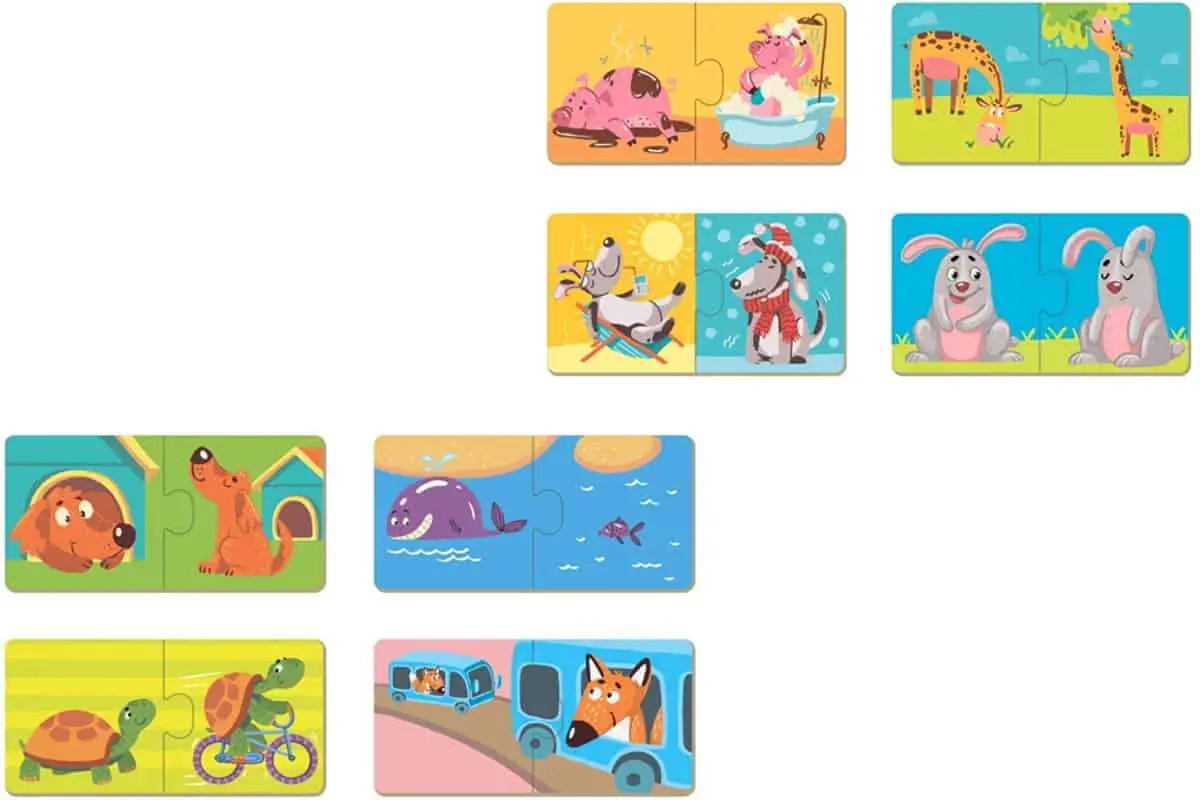
★★★★☆
For Families | Age 4+ | 1+ players | Duration 10-20 min
If you’re looking for puzzles for your younger children, I highly recommend Puzzle Opposites . This is a set of 12 puzzles with illustrations only.
. This is a set of 12 puzzles with illustrations only.
I like this game because:
- it features fun and engaging animal illustrations to show opposite terms
- the pieces are wordless, so your child can focus on understanding opposites and not reading
- it shows common concepts that are easy to understand for younger children
- it is excellent for building observational and speaking skills because you can use the pieces to prompt your child to describe what is in these puzzles
- the puzzles are self-correcting
- it widens the vocabulary of non-readers
The only downside of this puzzle set is it needs a lot of adult supervision, and it only comes with 12 puzzles.
First 100: Shapes & Opposites Puzzle Cards (Briarpatch)
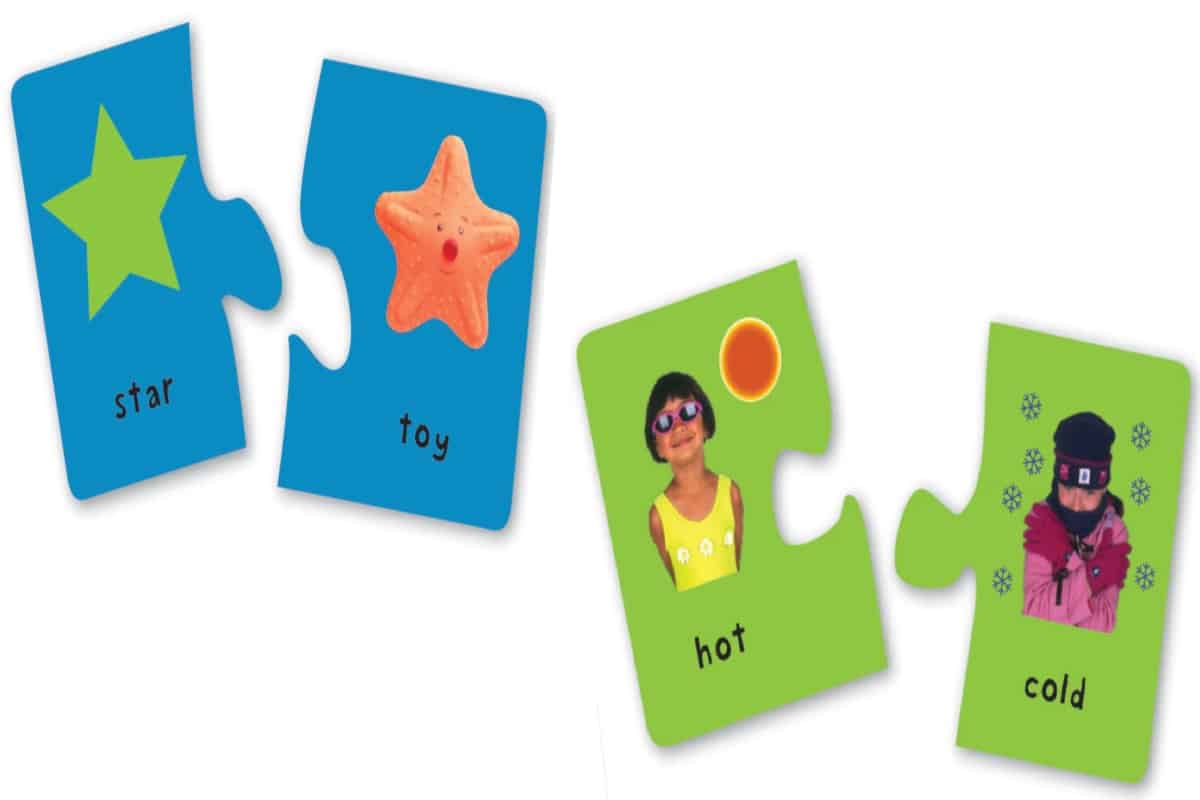
★★☆☆☆
For Families | Age 3+ | 1+ players | Duration 10-20 min
First 100 Shapes & Opposites Puzzle Cards is a set of self-correcting puzzles that you can use to teach shape recognition and opposites. It is based on the First 100 Words books, but these are not necessary to play with this set.
The shape puzzles let children put matching pieces of shapes and examples of objects with the same shape. This part of this set is great for developing memory, shape recognition, and problem-solving skills. They are great for preschoolers and toddlers because reading is unnecessary.
The opposite puzzles also widen children’s vocabulary. These pieces show actual pictures of people or objects to illustrate the antonym pairs. However, I think these images are not all easy to identify without adult supervision, especially if you’re going to use this set with non-readers. There are also only 12 opposite pairs. So, this game has low replayability.
Opposites (Kids Academy)
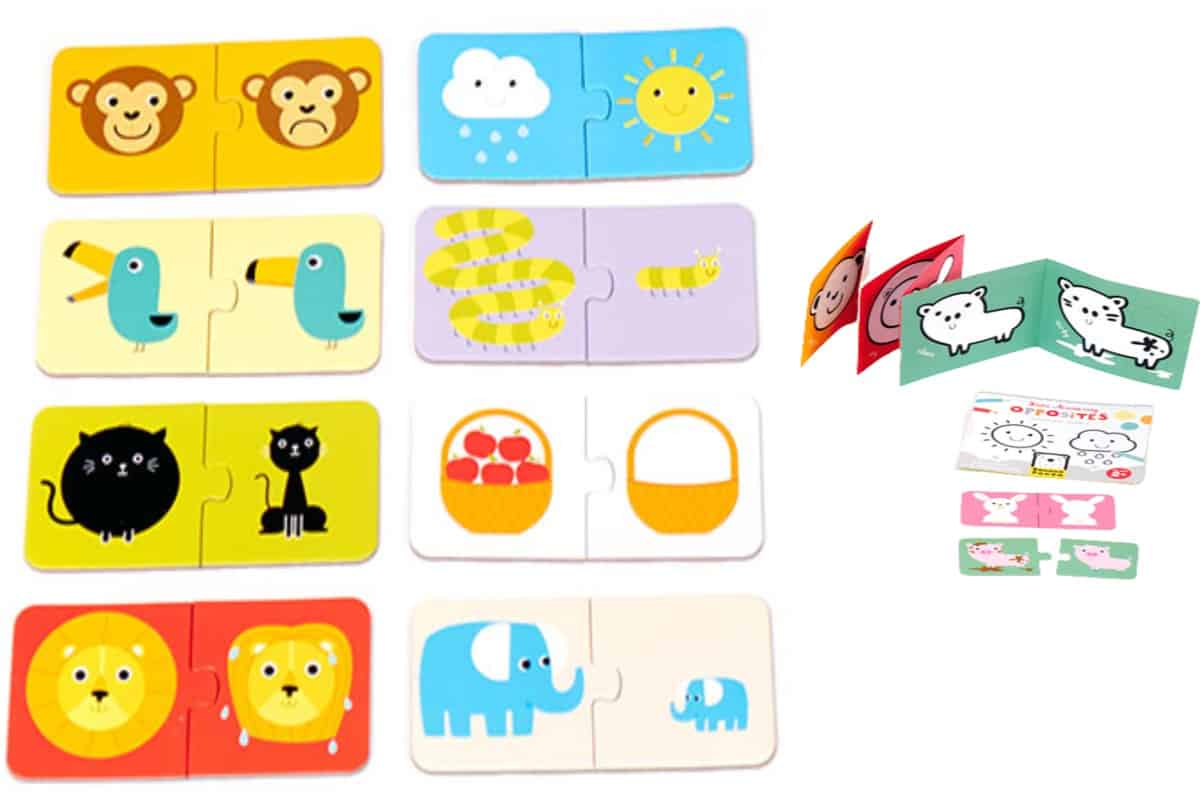
★★★☆☆
For Families | Age 3+ | 1+ players | Duration 10-20 min
Opposites by Kids Academy is a set of puzzles and coloring pages that teaches antonym pairs to young children. There are 10 puzzles with animal illustrations of opposite terms. The words included are:
by Kids Academy is a set of puzzles and coloring pages that teaches antonym pairs to young children. There are 10 puzzles with animal illustrations of opposite terms. The words included are:
- happy-sad
- open-closed
- fat-thin
- rainy-sunny
- long-short
- full-empty
- big-small
- front-back
- dirty-clean
- wet-dry
I like this set because of its minimalist style. Children will not be distracted because the illustration just shows these opposite pairs. It is also not labeled, so it is perfect for non-readers. I also like the additional coloring pages that offer the same pairs because you can use it to develop their fine motor skills and reinforce the new concepts learned.
However, this game has low replayability because there are only 10 puzzles.
Antonym Puzzles (Junior Learning)
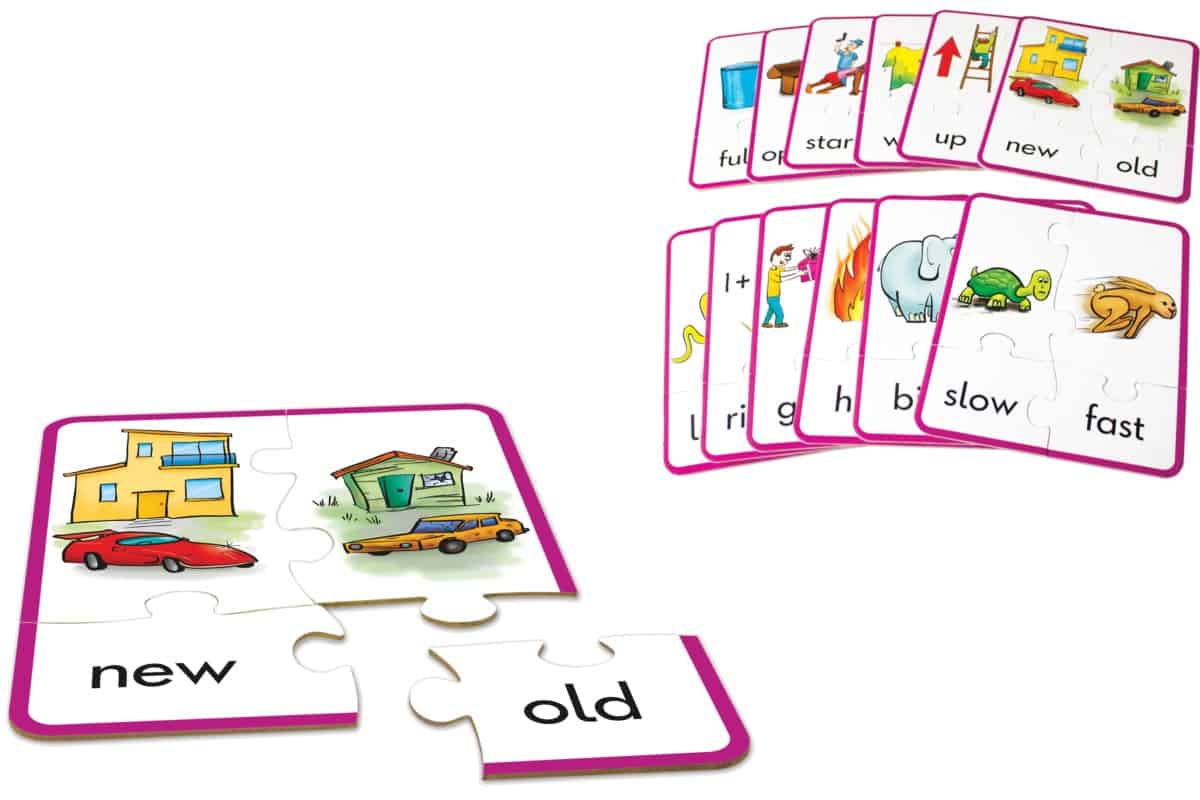
★★★★☆
For Families | Age 5+ | 1+ players | Duration 10-20 min
Junior Learning’s Antonym Puzzles is a four-piece puzzle featuring common adjectives and verbs. It comes with 12 puzzles that show opposite pairs and colored illustrations. The pairs included in the set are:
is a four-piece puzzle featuring common adjectives and verbs. It comes with 12 puzzles that show opposite pairs and colored illustrations. The pairs included in the set are:
- new-old
- big-small
- start-finish
- slow-fast
- open-closed
- right-wrong
- up-down
- give-take
- wet-dry
- hot-cold
- full-empty
- long-short
I like this puzzle because:
- the words are also mostly decodable, and sight words
- the illustrations are clear and simple
- it is self-correcting as pictures are coherent, so children receive immediate feedback
This set can also be played by younger children, but adult supervision may be necessary to correctly identify the words. You may also need to divide the pieces into smaller piles, so they will not be frustrating.
Opposites (Trend Enterprises)
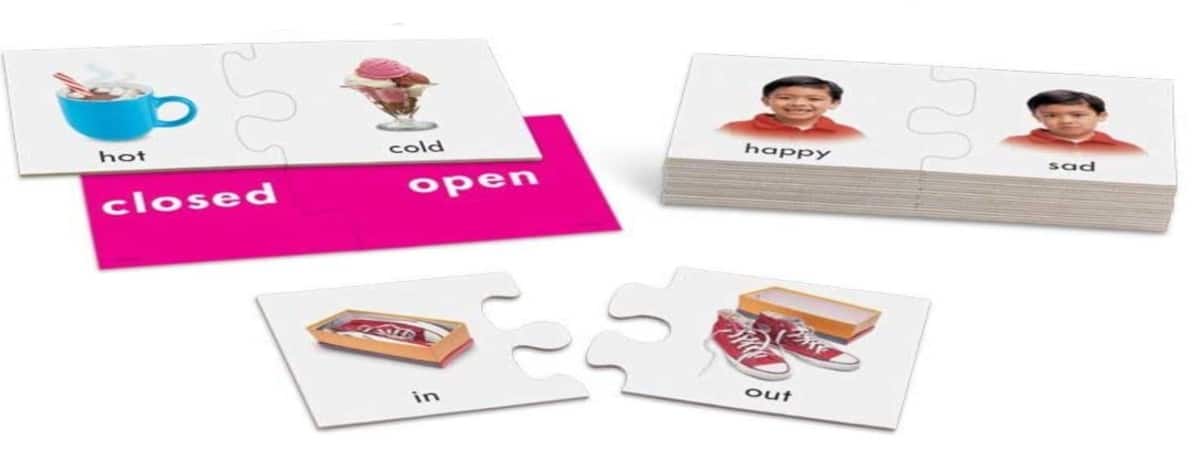
★★★★★
For Families | Age 4+ | 1+ players | Duration 10-20 min
Opposites by Trend Enterprises has 24 two-sided puzzles with the word and real-life illustration on one side and the word only on the other.
by Trend Enterprises has 24 two-sided puzzles with the word and real-life illustration on one side and the word only on the other.
This set features common adjectives, nouns, and prepositions. I like it because:
- it is two-sided, so you can opt to use the words only side for your beginning readers, or the illustration side with non-readers
- it is self-correcting
- the real-life illustrations are easy to understand
- it also teaches positions to young children
The puzzle pieces are also durable, so it is excellent for younger players.
Opposites (eeBoo)
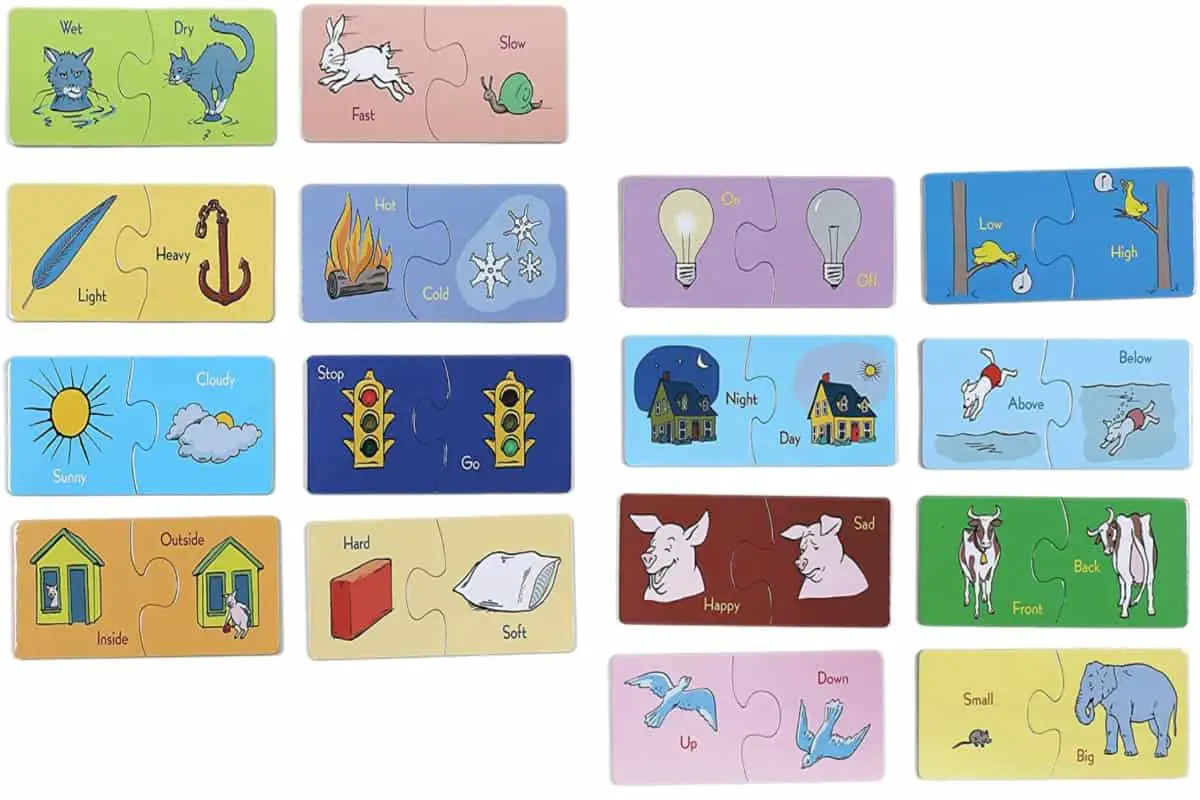
★★★★☆
For Families | Age 4+ | 1+ players | Duration 10-20 min
eeBoo’s Opposites features vibrant illustrations and 25 puzzles for beginning readers and non-readers. The words included are:
features vibrant illustrations and 25 puzzles for beginning readers and non-readers. The words included are:
- wet-dry
- fast-slow
- exit-entrance
- closed-open
- light-heavy
- hot-cold
- quiet-loud
- left-right
- sunny-cloudy
- stop-go
- on-off
- low-high
- inside-outside
- hard-soft
- night-day
- above-below
- awake-asleep
- empty-full
- happy-sad
- front-back
- short-long
- young-old
- up-down
- small-big
- thin-fat
I like that it uses common and decodable words, so it is an excellent tool for practicing reading too. Non-readers will also enjoy this game because the illustrations are vibrant and easy to understand. Children receive instant feedback because the puzzle pieces are self-correcting. The pieces are also color-coded, so even younger children can quickly identify the correct matches.
But words are really written very small, making them somewhat hard to read.
First Learning Puzzles: Opposites (Scholastic, Inc.)
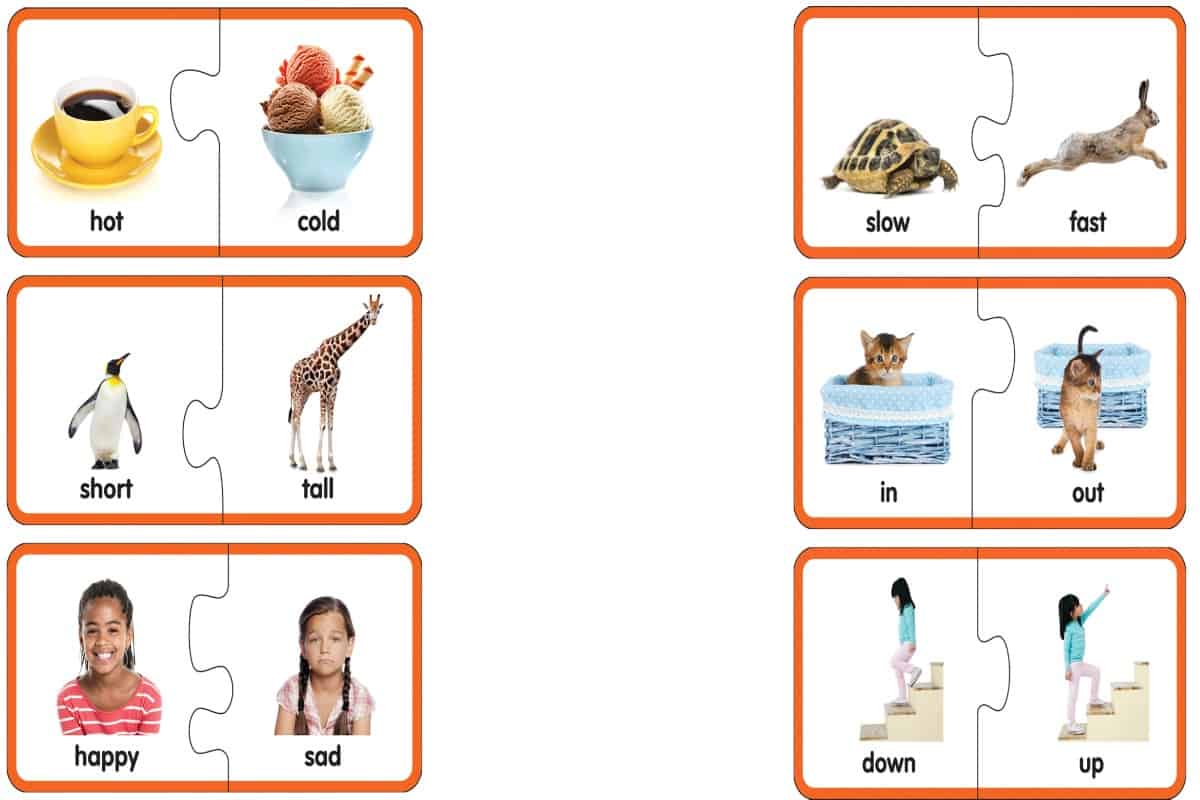
★★★★☆
For Families | Age 4+ | 1+ players | Duration 10-20 min
First Learning Puzzles: Opposites is an antonym puzzle with real-life illustrations of opposite word pairs. It comes with 25 self-correcting puzzles.
is an antonym puzzle with real-life illustrations of opposite word pairs. It comes with 25 self-correcting puzzles.
I think this is an excellent tool for teaching antonyms to preschoolers because the images are easy to understand. Even non-readers can enjoy the game as it is almost unnecessary to read the words, examples being common concepts that children can relate to. They will also get to know some prepositions like in and out and up and down.
Since it is designed for younger children, it also develops picture and word recognition.
Opposites (Youreka)
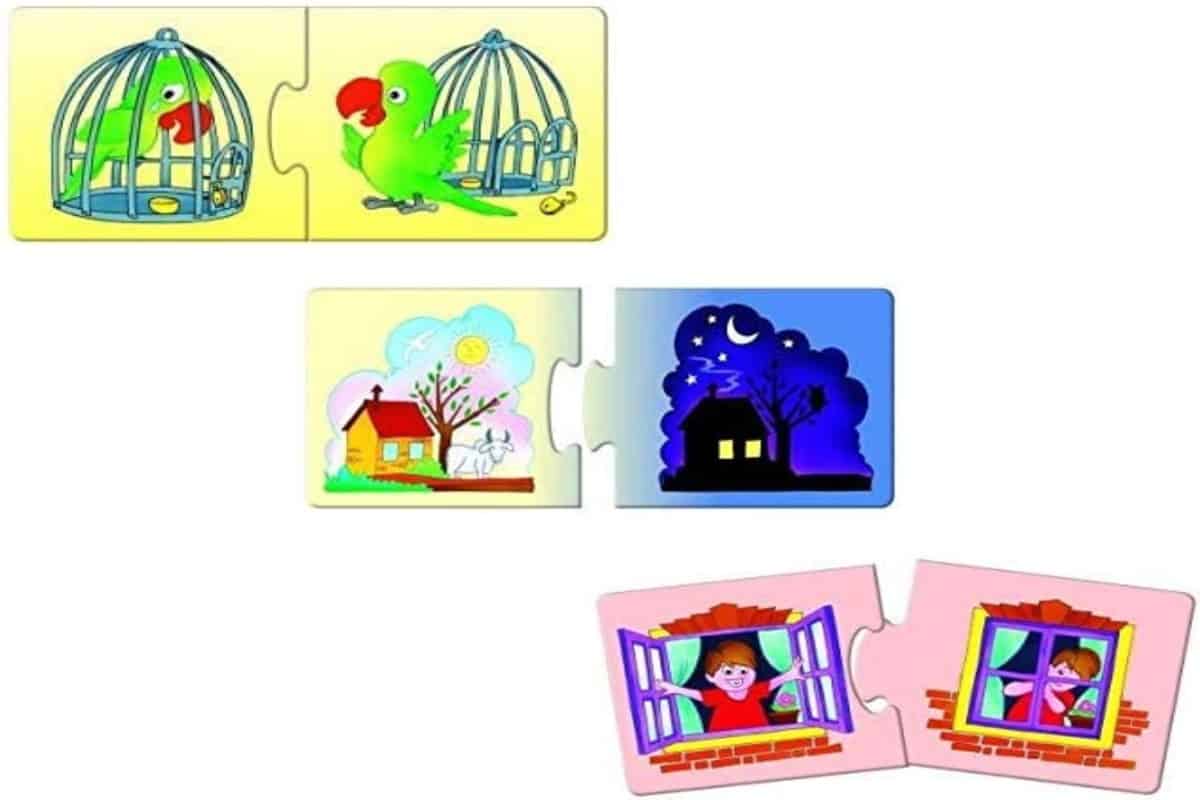
★★★☆☆
For Families | Age 3+ | 1+ players | Duration 10-20 min
Another good antonym puzzle game for preschoolers is Youreka’s Opposites . This set comes with 20 puzzles showing vibrant illustrations of opposite concepts.
. This set comes with 20 puzzles showing vibrant illustrations of opposite concepts.
This is great for young children because the pieces are unlabeled, so no reading is necessary when playing.
However, some images are unclear, making adult supervision necessary to correctly identify the terms for vocabulary development.
Opposites Train (ToyKraftt)
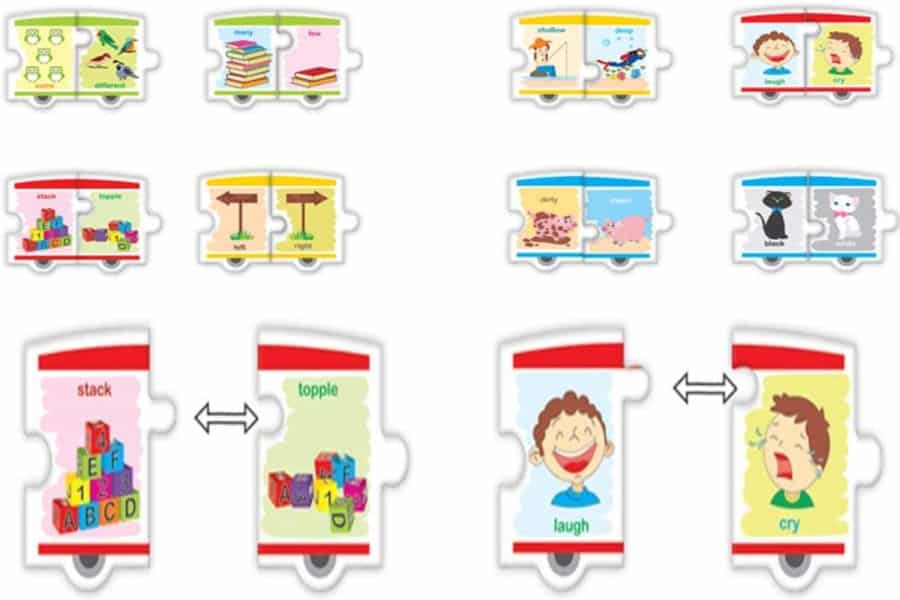
★★★★★
For Families and Schools | Age 6+ | 1+ players | Duration 10-20 min
Opposites Train features 40 opposite word pairs printed in train carriages. The pieces are labeled and have colored illustrations. They also have color-coded edges that correspond to five different attributes:
features 40 opposite word pairs printed in train carriages. The pieces are labeled and have colored illustrations. They also have color-coded edges that correspond to five different attributes:
- “I place” – shows positions
- “I act” – shows action words
- “I look” – shows emotions and appearance
- “I am” – focuses on physical qualities like dimension, size, and number
- “It is” – shows a state or time
I really like this set because it is fun to play with. Children can create rows of opposite word pairs to complete a train. Or they can just match the opposites together. This is also a great game because it is self-correcting. It also develops vocabulary and critical thinking skills as it also lets your child sort the puzzles into different categories.
Match It: Opposites (The Learning Journey)
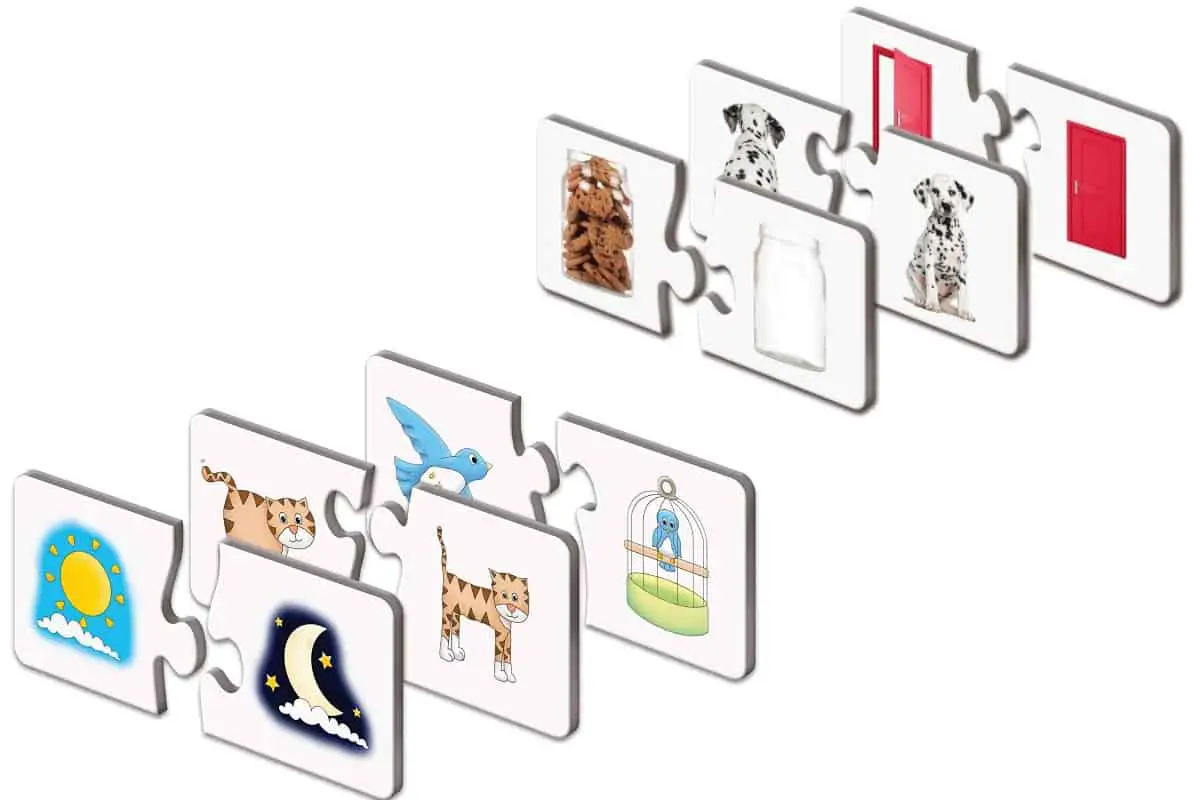
★★★★☆
For Families | Age 3+ | 1+ players | Duration 10-20 min
Match It: Opposites are picture puzzles that teach antonyms to preschoolers. It comes with 15 opposite pairs with colored illustrations.
are picture puzzles that teach antonyms to preschoolers. It comes with 15 opposite pairs with colored illustrations.
This puzzle set is perfect for preschoolers because:
- it is made of durable materials – thick cardboards, which is great for multiple uses
- it is a self-correcting puzzle
- it features simple illustrations that are easy to recognize
- it uses common concepts
- it is big enough for small hands
This game is an excellent tool for developing speaking skills because you can talk about relatable concepts and images with the child.
Opposites (Berwick Offray, LLC)
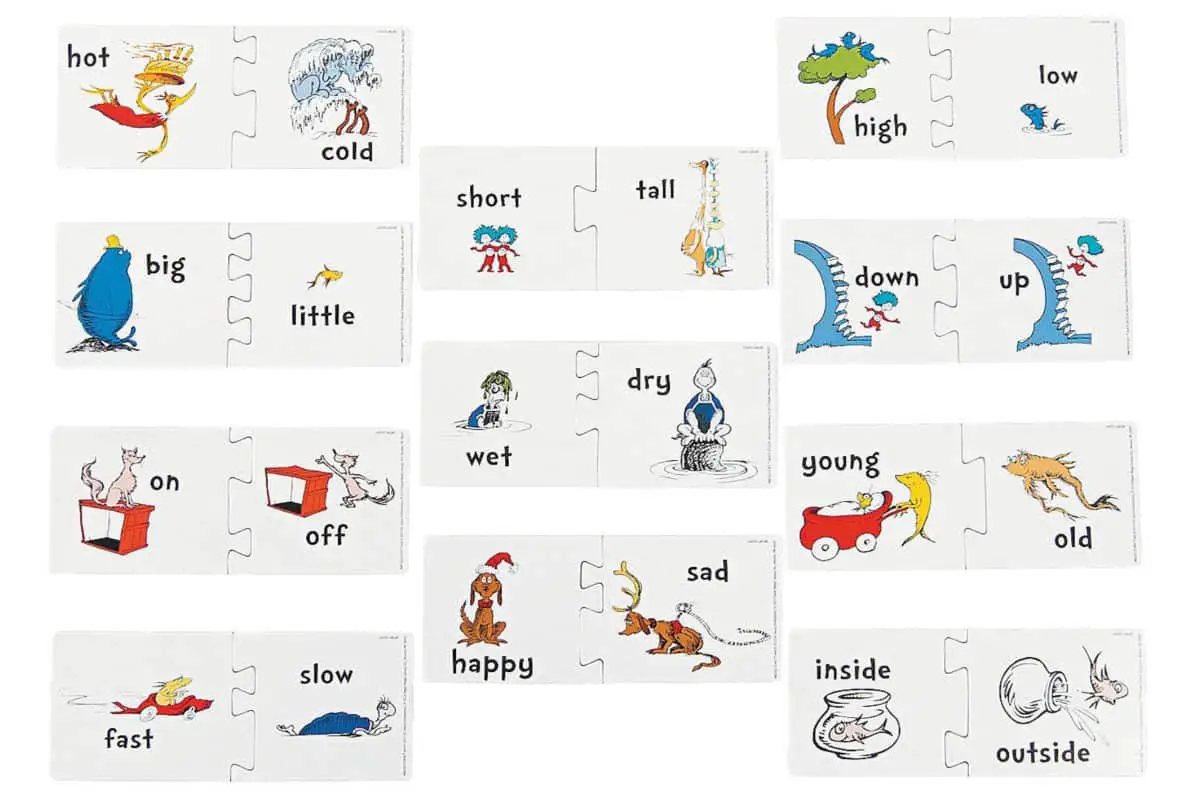
★★★☆☆
For Families | Age 5+ | 1+ players | Duration 10-20 min
Opposites is a Dr. Seuss-themed antonym puzzle set. The pieces feature Dr. Seuss’ characters to illustrate the different opposite concepts.
is a Dr. Seuss-themed antonym puzzle set. The pieces feature Dr. Seuss’ characters to illustrate the different opposite concepts.
I like this set because it is self-correcting. It uses common concepts: decodables and sight words. So, it is excellent for beginning readers. Illustrations are entertaining and relatable because they are popular characters from children’s books.
However, there are only 12 puzzles, which is really low.
Early Learning Opposites Puzzle Box (Wonder House Books)
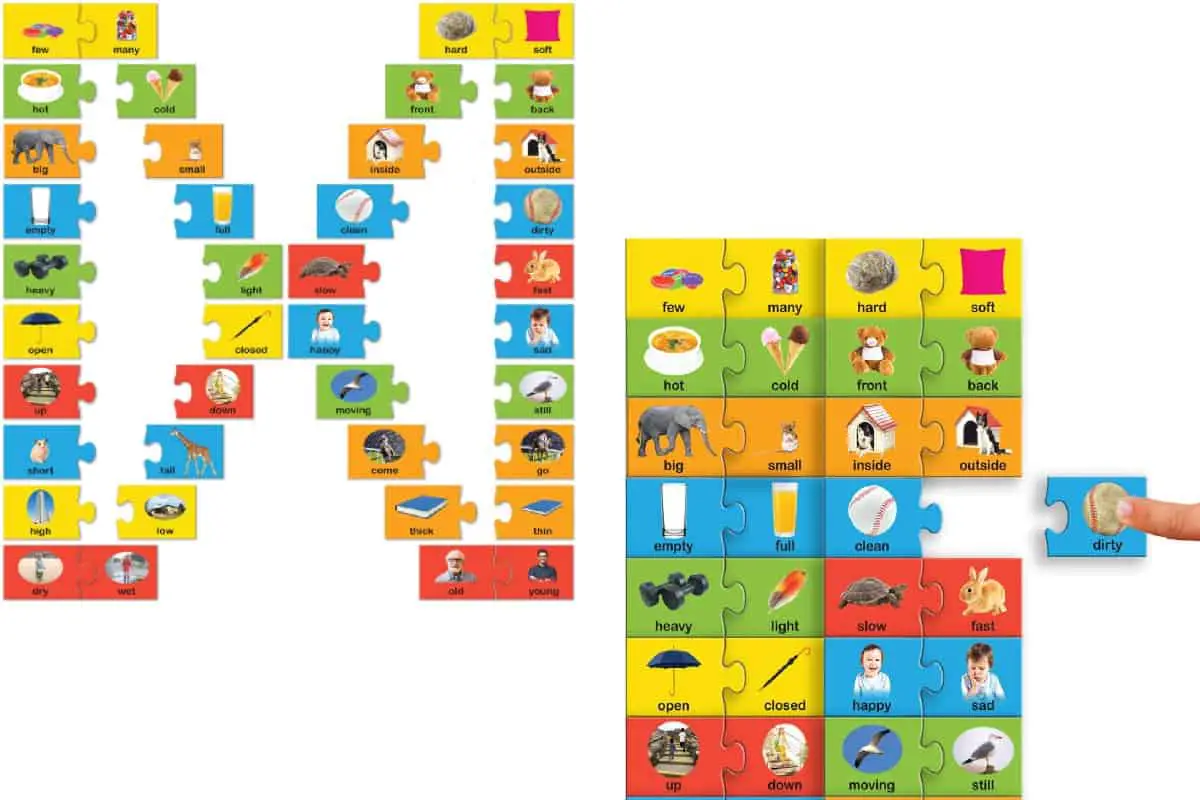
★★☆☆☆
For Families | Age 5+ | 1+ players | Duration 10-20 min
Early Learning Opposites Puzzle Box includes 20 puzzles that show antonym pairs. In addition, each piece features a real-life illustration and label.
includes 20 puzzles that show antonym pairs. In addition, each piece features a real-life illustration and label.
The words included are decodable and sight words, so beginning readers can easily identify them. However, adult supervision is still necessary because some words may be unfamiliar to young children. The cards are also not self-correcting as all the pieces have the same cuts.
And pieces are small, so some illustrations are difficult to see. This makes some of the differences in images between opposing concepts not too obvious.
Synonyms Puzzle Games
Synonym Match-Ups (Lakeshore Learning)
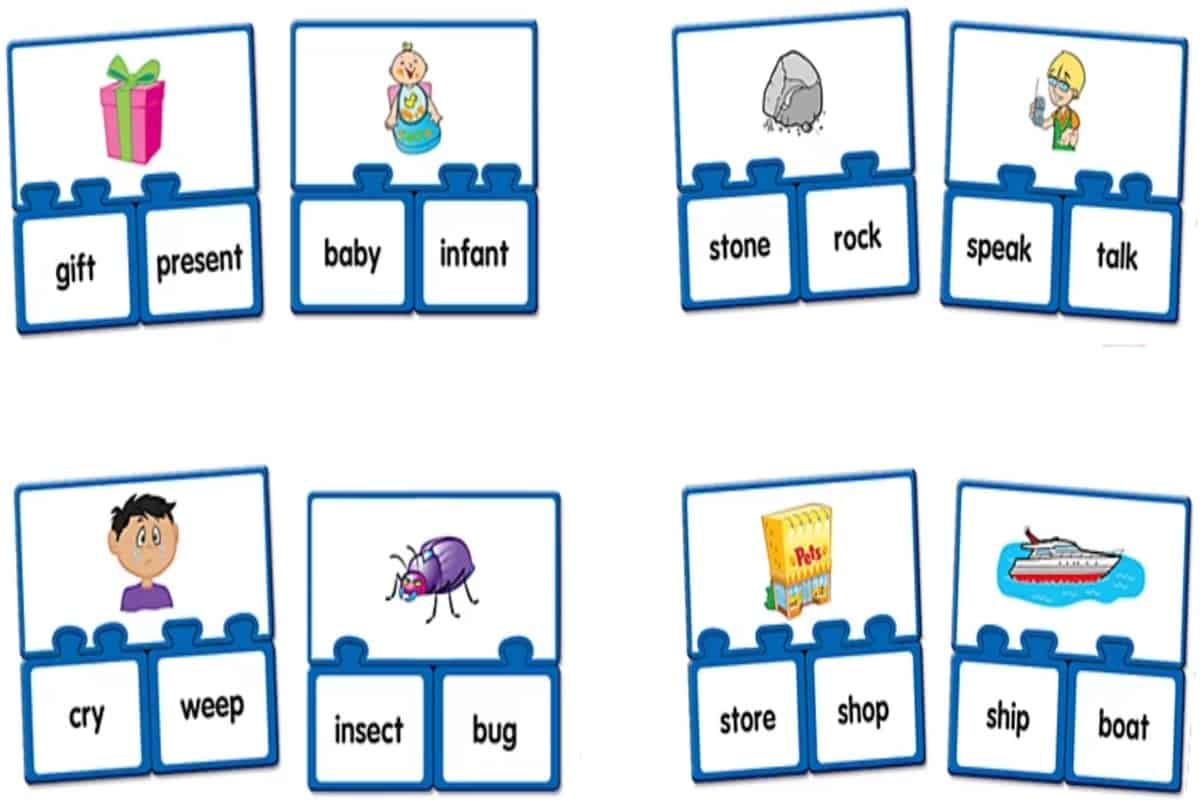
★★★☆☆
For Families | Age 6+ | 1+ players | Duration 10-20 min
Synonym Match-Ups is a three-piece puzzle featuring illustrations and synonym word pairs. This set is perfect for first graders who can read decodable texts and some sight words. It includes the following pairs:
is a three-piece puzzle featuring illustrations and synonym word pairs. This set is perfect for first graders who can read decodable texts and some sight words. It includes the following pairs:
- gift-present
- baby-infant
- store-shop
- ship-boat
- smile-grin
- jump-hop
- cry-weep
- insect-bug
- stone-rock
- speak-talk
- rip-tear
- afraid-scared
I like this set because it is self-checking, so instant feedback is given to children. It also features common words and easy-to-understand illustrations. So, minimal adult supervision is necessary during play.
However, there are only 12 pairs in this set. Therefore, it also has low replayability.
Synonym Puzzles (Junior Learning)
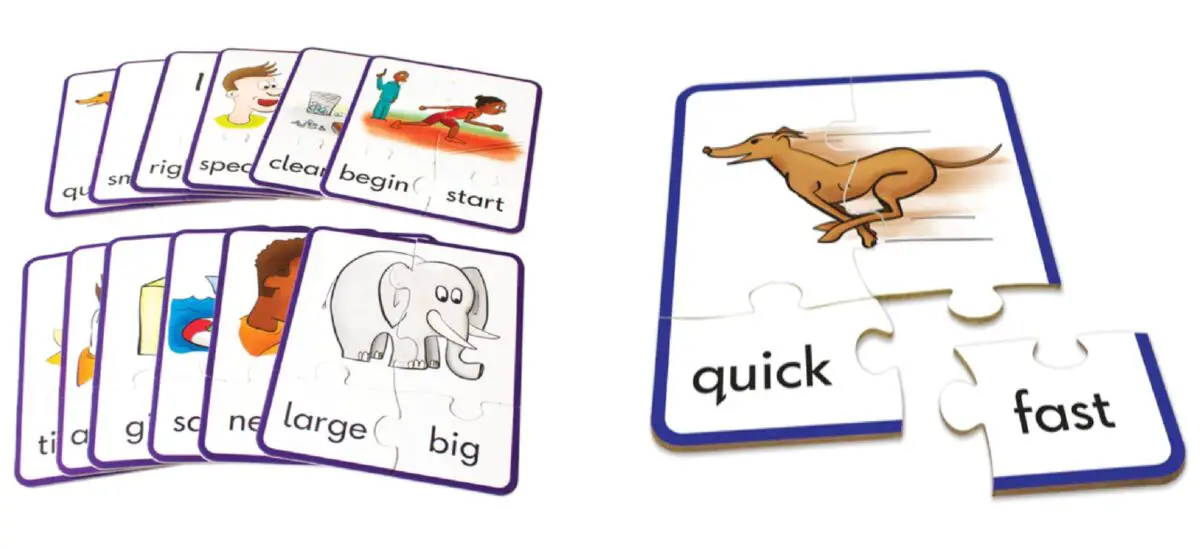
★★★☆☆
For Families | Age 5+ | 1+ players | Duration 10-20 min
Synonym Puzzles features 12 synonym pairs and four-piece puzzles. Children have to connect the pieces to complete the picture, and that word matches.
features 12 synonym pairs and four-piece puzzles. Children have to connect the pieces to complete the picture, and that word matches.
I think this is a great set to introduce synonyms to younger children because the words and pictures are simple. Verbs also show relatable situations, so your child can easily understand the new terms.
However, most of the words are not decodable. So, adult supervision is needed during play. You may also need to sort the pieces into smaller groups, as it can be confusing and frustrating for kids to look at 48 pieces at a time
Synonyms (Smart Kids)
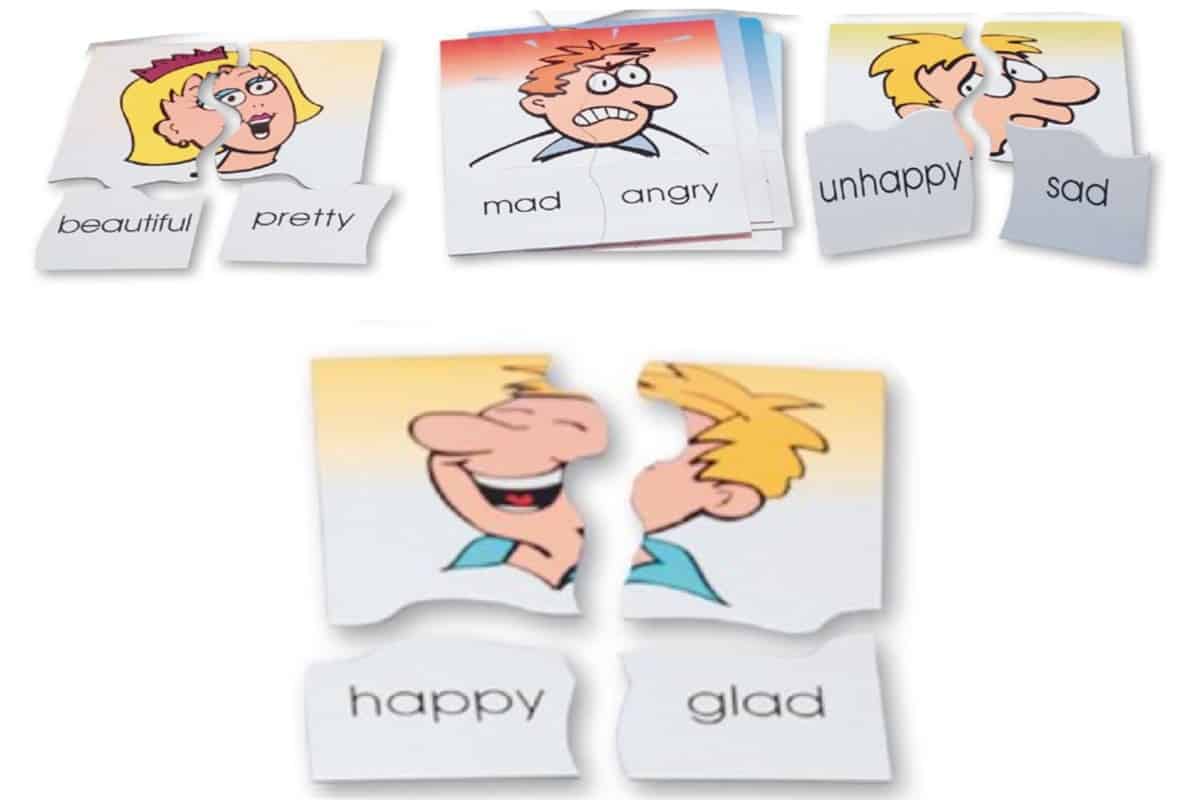
★★★☆☆
For Families | Age 5+ | 1+ players | Duration 10-20 min
Smart Kids’ Synonyms includes four-piece puzzles that show illustrations for synonymous pairs. It features a combination of nouns, adjectives, and verbs.
includes four-piece puzzles that show illustrations for synonymous pairs. It features a combination of nouns, adjectives, and verbs.
There are 20 self-correcting puzzles in this set. However, adult supervision is needed to read the words as not all of them are decodable. Some are common, while others may be less familiar for many children.
You may also need to divide the puzzles into smaller sets because younger players may find it overwhelming to look at 80 different puzzle pieces.
Other Vocabulary Card Games for Preschoolers and Elementary
Puzzle games improve children’s fine motor and problem-solving skills. They also bring fun to their vocabulary lessons. So, if you want them to have fun as they’re building their vocabulary, check out these other posts:
- 14 Vocabulary Flashcards for Simple Vocabulary and Test Preparation

- 14 Vocabulary Card Games from Pre-Kindergarten to Elementary

Edudingo.com is a participant in the Amazon Services LLC Associates Program, an affiliate advertising program designed to provide a means for sites to earn advertising fees by advertising and linking to Amazon.com. We also participate in other affiliate programs which compensate us for referring traffic.
